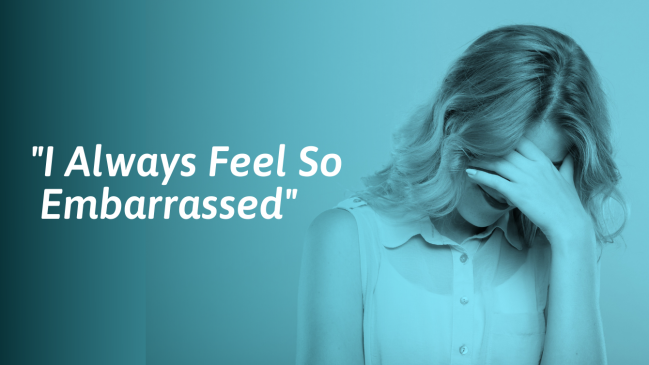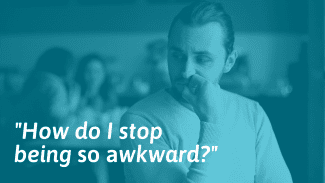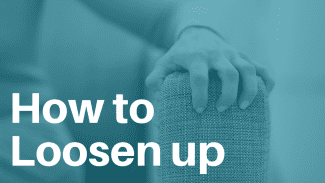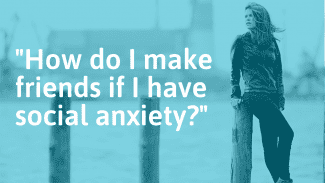“Why do I feel embarrassed all the time? I feel awkward for no reason whenever I am in public, even if I don’t say anything.”
Do you get embarrassed easily? Feeling embarrassed occasionally is normal, but it can also be a sign of social anxiety or trauma.
If fear of embarrassment is keeping you from socializing or interrupting your life in other ways, such as keeping you up at night because you are going over past mistakes, there are things you can do. Getting over embarrassment can feel difficult, but it’s not impossible.
Why you might feel embarrassed all the time
- You have social anxiety. Fear of embarrassment is one of the symptoms of social anxiety. Other similar symptoms are fearing situations where you may be judged, fearing that others will notice that you’re anxious, and avoiding speaking to people due to fear of embarrassment. If social anxiety is interfering with your life, you can learn techniques to manage it. Therapy and in some cases medication can help you get your life on track as you learn healthy coping strategies.
- You ruminate over past mistakes. If someone started following you around, narrating mistakes you’re making, you would feel embarrassed. But many of us do it to ourselves. Reminding yourself of past mistakes keeps you stuck in a state of embarrassment.
- You have low self-esteem. If you feel inferior to others, you’ll feel as though you have something you should be embarrassed about. Building your self-worth and self-esteem can help you feel that you are just as worthwhile as anyone around you.
1. Stay in the present
Feelings and emotions like sadness, shame, and embarrassment come and go quite quickly. But rumination (thinking of something over and over) keeps our emotions around longer than is necessary. Instead of letting the feeling pass us, we get ourselves even more worked up because we go over the story again and again. Rumination is also a symptom of depression and social anxiety.
When you catch yourself ruminating, bring yourself back to the current moment. Start noticing what you can hear, see, and smell around you.
If you are mid-conversation, focus on the other person’s voice. Listen to their words. Try to remain curious about what they are saying, feelings, and thinking. Doing so will help keep the focus off of your self-judgment and feelings of embarrassment.
2. Learn to let go of past mistakes
Imagine that you put every mistake and embarrassing moment in a backpack. You start taking this backpack around with you, everywhere you go. Over time, this backpack will start getting quite heavy. Your back will hurt and distract you when you’re trying to engage in conversation. People will begin to notice you’re lugging it around and asking questions.
Keeping a score of all your past mistakes is like that backpack, except they occupy space in your thoughts instead of physical space. But they can feel just as heavy and debilitating.
Now, you don’t need to throw around these memories completely. They’re a part of your past and important to remember. We can use our past mistakes to learn and grow. But you can learn to leave your mistakes and embarrassments “at home” instead of bringing them along to every social interaction.
We have a guide that will help you let go of past mistakes.
3. Challenge your negative self-talk
Feeling embarrassed is usually accompanied by an inner critic and negative beliefs about yourself.
There are two main ways to deal with an inner critic.
The first is to note when the inner critic is bringing up something negative about yourself, noting it, and letting it go.
For example, say you’re walking with some friends and trip over a pebble. Critical thoughts come up: “I’m so clumsy. They must hate being seen with me.” You can say to yourself, “there’s that ‘clumsy’ story again,” and try to let it go by returning your attention to the present moment and what your friends are saying.
You can practice this type of noticing and letting go through meditation and other mindfulness techniques.
The second method is to challenge your negative stories directly. When you notice thoughts like, “I’m a failure,” or “I’m so ugly,” you can respond to them directly.
For example:
“Everyone has flaws. My friends don’t care as much about how I look as I do.”
“I’ve had successes in life and I am doing my best. I am only in competition with my past self.”
4. Keep showing up
When we feel embarrassed and ashamed, our tendency is to want to hide. When we feel embarrassed around a specific person, we don’t want to be around them.
While this approach makes sense emotionally, it can often backfire. Hiding can reinforce our belief that we have done something that we need to hide from. And it often draws more attention to ourselves, which makes us want to hide even more.
If you feel extremely embarrassed over something that happened at school or work, try to overcome your desire to stay home the next day. Prove to yourself and others that you can deal with feeling embarrassed. You don’t need to be ashamed of yourself.
5. Don’t try to be like anyone else
We often feel embarrassed because we feel like we’re different or don’t fit in. You may feel ashamed of yourself because you talk too much compared to other people, or just the opposite! Maybe you’re judging yourself for being “quiet and weird” while people around you seem outgoing and cool.
“Just be yourself” is easier said than done (which is why we have a guide on how to be yourself). Remind yourself that the world would be pretty boring if everyone was the same.
We learn from each other through our differences. Your weird hobbies, quirks, interests, and qualities are nothing to be ashamed of. They’re what make you who you are.
6. Practice using humor
It’s hard to laugh at ourselves when we feel sensitive and embarrassed, but laughing at embarrassing situations helps us move on from them. It teaches us that we, and other people, don’t have to take them too seriously.
Note that you shouldn’t be putting yourself down or making fun of yourself all the time. The goal is to show that you don’t take yourself too seriously, not that you dislike yourself.
We have some tips on how to be funnier in conversations that you can use when you feel embarrassed.
7. Stop “shoulding” yourself
Embarrassment often comes when we have high standards for ourselves. If you’re telling yourself that you shouldn’t be making mistakes, that you should be funnier, that you should be a better listener, you should be interested in what everyone else is, and so on, you’ll always feel that there’s something wrong with you and that there is something you should feel embarrassed about.
The truth is that we’re all works-in-progress. Consider if you are setting your standards for your behavior too high. Is there some wiggle room in there? Remind yourself that you are just as you should be right at this moment. No one can be everything at once. You can always learn and change, but let it come from a place of self-love rather than from a place of telling yourself you should be different than how you are.
8. Ask yourself what are you embarrassed about
Are you embarrassed around a specific person who was once mean to you or every time you’re in public? Do you feel embarrassed one-on-one or just in group situations? Is it that you ramble or don’t make sense to other people?
The more understanding you can have regarding your feelings, the more equipped you’ll be to deal with them.
Once you understand which situations make you feel embarrassed, you can tackle those problems one by one. You can work on building self-esteem, learn how to deal with group conversations, and practice becoming comfortable with eye contact. Break it down into smaller, more manageable goals, and tackle those directly.
9. Recognize the feelings beneath the embarrassment
Feelings tend to appear together. For example, behind anger, there is normally fear. In fact, fear is behind many emotions and often appears with embarrassment as well.
Notice what stories and feelings come up when you feel embarrassed. Are you afraid that people will make fun of you? Perhaps there’s a fear of being alone or exposed. Maybe there’s a sadness about not having had friends during childhood. Try journaling about your fears and underlying emotions to understand them better.
10. Connect with others over similar experiences
Sharing your feelings of embarrassment and shame can be the epitome of embarrassment. Yet when we risk being vulnerable, we have the opportunity for something beautiful: connecting with someone who knows how we feel. Talk to someone you trust about how you feel.
Sharing our embarrassing stories can inspire others to share their own. As a result, both people end up feeling understood and less alone. And the truth is, even people who look like they have it all together have had embarrassing moments in their life.
Common questions about feeling embarrassed
Why do I feel embarrassed all the time?
Constant feelings of embarrassment can be a sign of social anxiety, low self-worth, or trauma. You may assume that there is something wrong with you that others will see if they will get to know you, or perhaps you tend to ruminate over past mistakes.
How do I stop feeling embarrassed?
It’s impossible to avoid ever feeling embarrassed. But you can learn to deal with your feelings so that you won’t let feeling embarrassed stop you from doing anything you want in life.









I’m amazed on how this change my whole situation. You read my mind, i was not going to show up for the next gathering. Thanks a lot Viktor. You have saved this lady’s day!